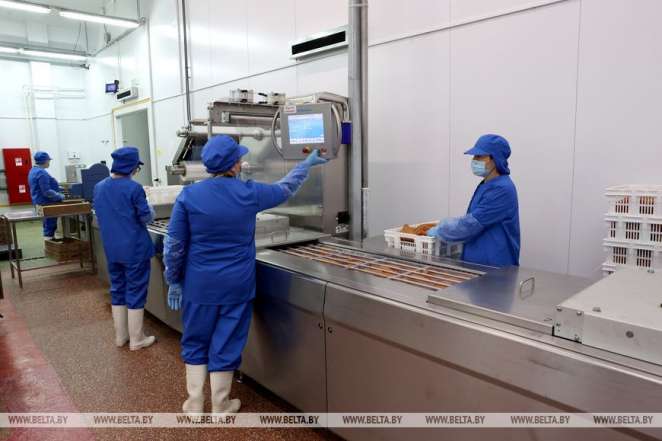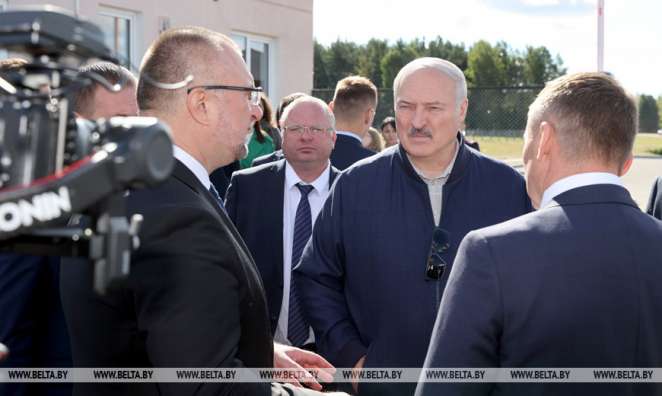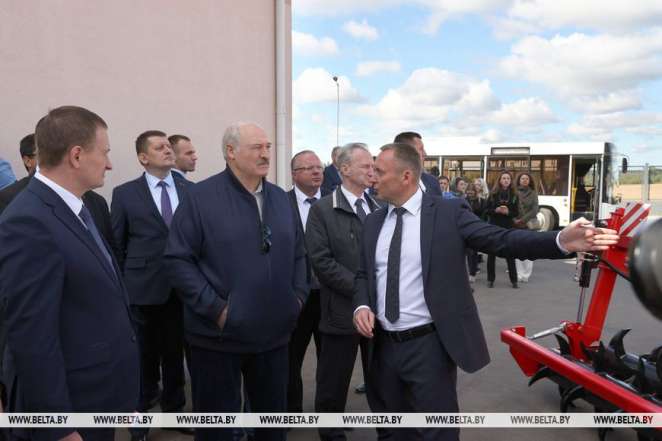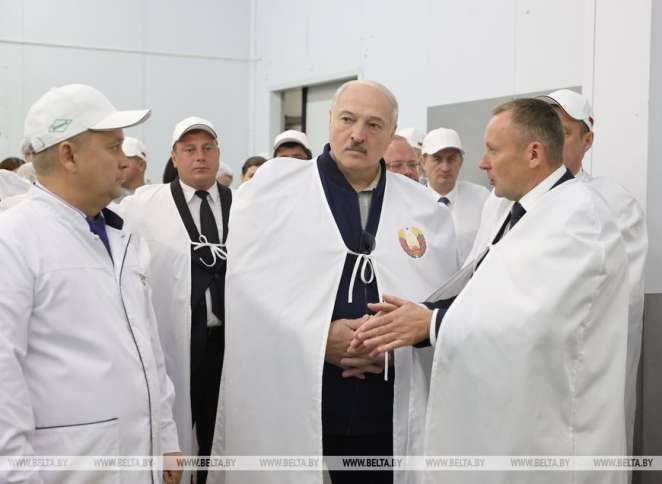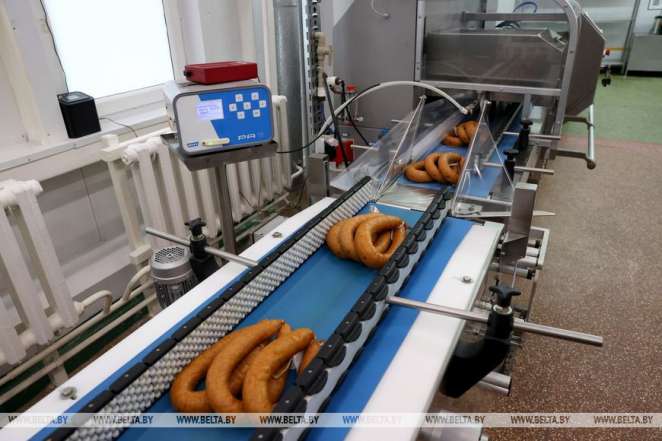Lukashenko: Further modernization of agriculture is number one task for Belarus
5 September 2022, 13:29
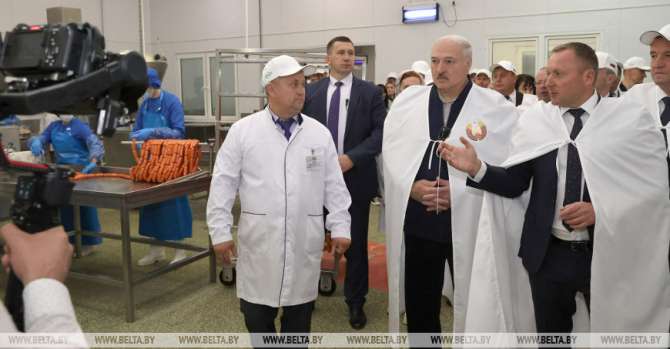
“Further modernization of agriculture is the number one task today. Another important task is to help struggling farms,” said the head of state.
The president first asked Deputy Prime Minister Leonid Zayats about his assessment of the work in the agricultural sector of Krupki District.
“Positive one,” the deputy prime minister replied and cited a number of growth figures. Work on the lands, which were transferred to the agricultural company Agrokombinat Dzerzhinsky, has become significantly efficient.
The president said that half of the farms work well across the country. Half of the rest are farms which will survive with some help and support, he said. A quarter of all farms need to be saved. “There is workforce and fertile land there,” said the Belarusian leader.
In his words, there are several ways to implement this task.
Some agricultural enterprises and land will have to be merged in order to set up new farms virtually from scratch, as it was done, for example, in Myadel District.
Other farms will be attached to industrial enterprises. Such practice has been already gained pace in the country. “It will be fair. After all, industrial enterprises lure people out of the village. Therefore, they should pay their debts,” said Aleksandr Lukashenko. The head of state has recently agreed on the appropriate approaches while on a visit to Gomel Oblast.
“We will continue attaching unprofitable farms to industrial enterprises,” added the head of state.
The example of Krupki District shows a third way, which is the coincidence of interests. On the one hand, there were lands in the district that did not give the desired result. On the other hand, there was a large processor and producer in Minsk Oblast – Agrokombinat Dzerzhinsky, which needed additional agricultural land for production. Instead of imports, the company took land in Krupki District and set up efficient production there.
“You cannot feed poultry with haylage and silage. He [the head of Agrokombinat Dzerzhinsky] could have bought this grain somewhere in Russia. But he did something different (well done, and well done to the governor, too) - they began to give away the land. You are welcome to plow, get grain and feed chickens,” said the Belarusian leader.
“I mean not only to show the forms and methods of helping these 25% of farms, which are still in a difficult condition throughout the country, but to ask you first of all, Leonid Konstantinovich [Deputy Prime Minister Leonid Zayats], and the State Control Committee to prevent any purchases of grain from outside. We have enough land to produce grain here, to feed poultry and pigs, and to process the grain into good fodder and feed livestock. Then produce meat and milk. That is simple arithmetic,” the president explained.
Thus, the novelty in Krupki District is one of the approaches to solving the above-mentioned problem. “This is the matter I would like to see and show everyone, and to point out that this is a good way and a good thing to do,” the head of state said.
According to Aleksandr Lukashenko, these efforts have been solving the government task as well. That is one of the main reasons why the president favors preservation and development of large farms, so-called kolkhozes and sovkhozes.
“He [the head of the agricultural company] needs land. We need him to take care of people, too. Why do I stick to large farms - kolkhozes and sovkhozes? They perform a social function, maintain the village. We are developing agro-towns here. It is a long process. We will be working here to build roads, trading facilities, kindergartens, schools and so on. These large farms are responsible for all the social programs. That is why for me the heads of these enterprises are the people of the state,” Aleksandr Lukashenko said.
The president added that it was also possible to set up farms, if there are farmers, and to distribute land, but the farmer may no longer bear the social burden. “Our farmers carry this social burden as well. Well done. Our state policy is such: if you want to take the land of yesterday's kolkhoz, you are welcome to take it with the village, production facilities. That is the policy in the country's agriculture. By doing so we save the rural areas, give jobs to local people. This is our policy in agriculture,” said Aleksandr Lukashenko.
The president is sure that there should be control in this area, so as not to get negative examples of land sharing, as it is done by some neighbors, particularly Ukraine. “We need control everywhere. The same is true about farming. I do not want farmers hearing this to think that we are against them. If the farmers came here instead of it [the agricultural company], they would took 40% of these lands [in Krupki District], gave people work, built houses, helped them, developed a production base. We would be only glad and happy!” the president said.
Aleksandr Lukashenko also recalled the instruction he gave during a working trip to Grodno Oblast to reduce the price of housing in rural areas. “We should build housing and attract people here,” he said.
The president also drew attention to the personnel issue and labor discipline. “If we want to keep it all, save ourselves, it is a question of security, national interests, and independence. “Personnel is key,” he stressed.
“The ways have been found. It is already a movement along these paths to improve agriculture,” the head of state said.
Aleksandr Lukashenko visited the meat processing plant. He was briefed on the state and prospects of development of the agro-industrial complex of Minsk Oblast, including integration structures.
Minsk Oblast Governor Aleksandr Turchin suggested that 50% of funds from the Innovation Fund of Minsk Oblast Executive Committee should be used to finance investment projects, such as in Krupki District. Plans are in place to build new poultry houses here.
“It is quite possible,” the head of state said instructing to consider and take into account the relevant issues when planning the budget for the next year.
He also emphasized the importance of prompt reclamation works.
Vladimir Lukyanov, the director general of the agricultural company, told the media that the organization has followed the way of scaling up to become a serious player not only in the country, but also in other markets, and the work is proceeding quite well. The company's products are well-known abroad, including in Russia and China.
The agricultural company is implementing a number of projects to increase production, develop the manufacturing of new types of products. This gives dozens and hundreds of new jobs in the regions, contributes to the development of regional economy. The agricultural company is located in eight districts of Minsk Oblast.

